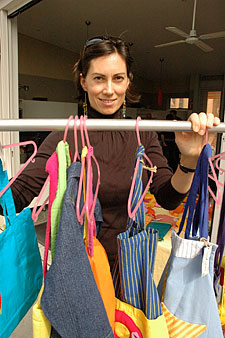Fairtrade Fortnight begins in Australia this week, sydneyanglicans.net asks whether church-Fairtrade partnerships is a viable option in Sydney. Over 90 per cent of the individuals who sell the UK’s leading fairtrade organisation’s products are committed Christians who operate out of local churches. Could this English model work in Sydney?
With an eye on outreach, about 50 Sydney churches have hosted a Tribes and Nations community market event.
"The main thing they get from inviting us is instant interest from the community," says Grant Murray, the former CMS missionary who now runs the Sydney-based Fairtrade online store. "Combining a talk on poverty and culture with a shopping time is a great attraction."
About one-third to one-half of people who have attended these church-run events are non-Christians.
While these one-off sale events are good for business, it is clear that Grant is disappointed that most churches themselves choose to ignore the justice message he also seeks to preach.
 "We are currently less inclined to go down this path unless the church is willing to start talking about buying Fairtrade coffee and tea themselves. Otherwise it is a contradiction to use it as a promotional tool and not do it yourselves," he said.
"We are currently less inclined to go down this path unless the church is willing to start talking about buying Fairtrade coffee and tea themselves. Otherwise it is a contradiction to use it as a promotional tool and not do it yourselves," he said.
The UK's leading Fairtrade organisation Traidcraft clearly sees the link between Fairtrade and outreach.
"The core strength of our trading company is our national network of "Fair Traders" " ordinary people who sell our products from stalls in their churches, schools, community centres… 90 per cent of them are church-based," says Peter Collins from Traidcraft.
Traidcraft is now a major sponsor of the Church of England's "Back to Church Sunday" initiative which has grown to include 1000 churches in 20 dioceses.
The initiative has seen 7500 people join these churches in just three years. Traidcraft provides showbags for parishes to hand newcomers, which include prayer resources, invitation cards and Fairtrade "welcome" T-shirts.
Grant Murray openly admits that Tribes and Nations wants to emulate Traidcraft's church partnership model. While Grant does see that churches operating as Fairtrade suppliers can be an integral part of the Archbishop's desire to "reconnect the churches with their wider community", he moreover sees it as "shoring up the integrity of churches as they convey that they are interested in issues that don't only benefit themselves".
Context for contact
An investigation by Southern Cross suggests little more than a dozen Sydney Anglican churches are committed to Fairtrade.
The longest serving Tribes and Nations trader is Libby Collison, 23, from St John's, Beecroft. Libby says that as Christians we have no choice "but to pursue justice and show mercy to all".
"Knowing the plight of millions, resulting from current trade practices, we cannot sit back and claim ignorance as abuse and enslavement continues," she says.
In the middle of a quiet and leafy northern suburb, St John's, Beecroft is far from a retail hub. Nevertheless Libby agrees that being a Fairtrade outlet has helped St John's build links in the community.
"Promoting, advocating and using Fairtrade products at our services, in our outreach and at our annual Fairtrade Fair have allowed our church to build bridges into our community," she says.
Libby says that supporting Fairtrade has created "neutral" territory, which has seen friendships grow with secular locals.
Libby's father Geoff is the rector of St John's. Asked if anyone has joined the church directly as a result, he said, "probably not, but it has provided a context for increased contacts".
Regularity: key to connection
Unlike Beecroft, All Souls, Leichhardt is ideally located as a Fairtrade shopfront smack in the middle of the Norton Street café strip in Sydney's inner west.
Since it began two years ago, local minister the Rev Dr Tim Foster says the weekly Fairtrade Fair has given All Souls "a big positive profile" in Leichhardt.
"We have built up a regular group of customers who come in for their coffee and think of us when they need to give a gift," adds Hester MacMillan who spends about two hours a week coordinating the Fair.
"Being weekly it makes us more visible, and somewhere people can just pop in to without having to plan or remember a particular date."
Dr Foster says the weekly nature of the café is the ministry key. This is because church volunteers start to build relationships with regular customers.
"People often ask questions about the church that have sometimes led to gospel conversations," he says.
"It provides a common ground," agrees Hester. "You never know when that may move someone [to] consider coming to church…"






















